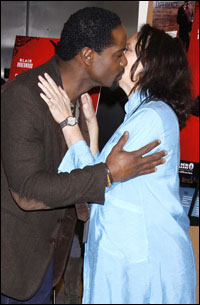
*
No pressure, but the fact remains: Daphne Rubin-Vega was never on Broadway in a Pulitzer Prize play without being nominated for a Tony Award. She debuted as the heroin-addicted Mimi in Jonathan Larson's La Bohème update, Rent, and later did the adulterous Conchita in Nilo Cruz's Anna in the Tropics.
Now at the Broadhurst Theatre, she takes on her third Pulitzer opus, Tennessee Williams' 1947 spicy slice of New Orleans strife, A Streetcar Named Desire.
She's Stella DuBois Kowalski — ragdoll of the piece — divided by both names, pulled this way and that by her brutish husband, Stanley, and her needy sister, Blanche, while mustering some household decorum. Better she shoulda stood in bed. [For the record, the Williams estate granted the producers permission to cut "Kowalski" from the script, since this production is set in a multi-racial New Orleans; Stanley's heritage is now African American and not Polish.]
"She's trying to keep fire and gunpowder from coming together," the actress says, "trying very hard to make peace with these two people she loves most in life. She has to make a choice. It's interesting the choice she makes and why, and it's painful." But is it the right choice? "I'm a little angry with Stella's choice — saddened by it — but I know the reason she makes it. It's not a good choice. I'll be wrestling with it."
In a sense, the die was cast for her character years before the play begins, Rubin-Vega contends: "She made a very clear decision to leave Belle Reve and go explore her own world at the risk of proverbially throwing her sister under a bus." He may not look it or act it, but Stanley Kowalski turns out to be the "belle reve" (French for "beautiful dream") Stella found on leaving the DuBois ancestral home in Laurel, MS.
Those previous Pulitzer bumps give Rubin-Vega a jump on her co-stars — Blair Underwood (Stanley), Nicole Ari Parker (Blanche) and Wood Harris (Mitch) all make their Broadway bows here — and she made the cut primarily because McCarter Theatre artistic director Emily Mann directed her in Anna in the Tropics.
 |
||
| Blair Underwood and Daphne Rubin-Vega |
||
| photo by Jeff Fasano |
Previously, she helmed Williams' Cat on a Hot Tin Roof and two productions of The Glass Menagerie. One of the latter led to a personal relationship with the playwright. "Tennessee and I met because I did a production of it at the Guthrie in Minneapolis. I was the first woman to direct on that stage and with that play.
"It was a huge success, and his brother Dakin came up to see it. He said, 'Oh, my God! This is the best production I've ever seen of this play, including the premiere.' I was blown away. I was 27 years old, and I said, 'Oh, that's impossible.' He said 'No no no,' and he told his brother. Around then, Tennessee was about to put on a new play at the Goodman and asked me to direct it, and that's when we got to know each other."
The play was called A House Not Meant To Stand, and it never saw the light of stage. "I was too young. It wasn't ready. I worshipped him, and I didn't do it.
 |
||
| Blair Underwood and Emily Mann |
||
| Photo by Joseph Marzullo/WENN |
"I've made tiny little shifts and changes to make it accurate and authentic, to New Orleans and to black New Orleans — but I've made fewer than you would think, almost none. And, if we are doing it right, you won't, after a while, notice that at all. What happens is, it's so true to itself that you think Tennessee wrote it for this cast."
The location of the play is larger than Louisiana, she believes: "The landscape of any Tennessee Williams play is the human heart, and I have a cast of people with heart."










